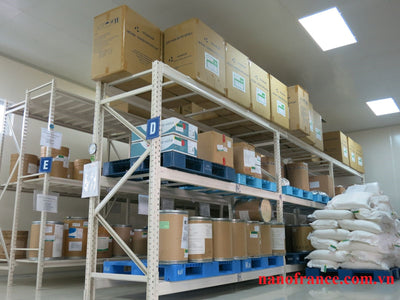FUNCTIONAL FOOD SUPPLEMENTS WITH VITAMINS AND MINERAL
Functional foods not only contain ingredients with high nutritional value but also have some health-enhancing benefits. Functional foods play a role in supporting the body against certain diseases by preventing certain nutritional deficiencies and promoting proper growth .
So which functional foods help supplement vitamins and minerals effectively for the body, let's find out in the following article.
Concept and importance of dietary supplements
Functional foods are being evaluated by experts as a nutritional trend of the 21st century. In modern life. Functional foods have been and are meeting an important part of human nutritional and health needs. Especially the group of foods that supplement vitamins and minerals for the body is being developed rapidly and required by developed countries such as the US, UK, France, European countries, Japan...
Concept of dietary supplements
Functional foods originated in Japan, first used by the Japanese in the 1980s.
According to the International Institute of Science and Life, "Functional foods are foods that are beneficial to one or more body functions such as improving health and reducing the risk of disease more than the nutritional value they provide."
According to the Vietnamese Ministry of Health, dietary supplements are foods with nutritional value to support the functions of organs in the human body. In addition, using dietary supplements will help the human body feel comfortable, increase resistance and reduce the risk of disease.
Concept of Vitamin and Mineral Supplements
Vitamin and mineral supplements are products that help supplement or compensate for, prevent the deficiency of essential vitamins and minerals in daily meals. Especially organic groups that cannot be synthesized by themselves such as vitamins. In addition, these products also play an important role in providing minerals for the development or reproduction process in the body.

Vitamin and mineral supplements
The Importance of Functional Foods
Nowadays, functional foods have become popular in the field of health care and protection. People are increasingly aware of protecting their health with a healthy diet. Therefore, supplementing functional foods to balance the diet is of great interest.
The use of functional foods brings positive changes to health and increase resistance for the user. This effect is achieved due to the role of the additional ingredients in functional foods. Those ingredients include vitamins and minerals.
Vitamins enhance immune function and are necessary for the body's energy synthesis process. At the same time, vitamins also participate in the vital activities of cells.
Meanwhile, minerals play an important role in the growth process, participating in cell structure. More importantly, minerals help balance fluids, maintain the development of teeth and bones, and support the function of the nervous system.
Classification and effects of Vitamins and Minerals
Vitamins and minerals can be divided into four main groups:
Water-soluble vitamins
Most vitamins are water-soluble, each with a specific role and function. These vitamins include B vitamins and vitamin C (ascorbic acid). These vitamins are water-soluble and are not stored in the body, and excess is excreted in the urine.
Some functions of vitamins include:
Vitamin B1 (thiamine): Converts nutrients into energy to provide for body activities. Helps promote digestion, prevents fatigue and fat accumulation in the arteries.
Vitamin B2 (riboflavin): necessary for energy synthesis and fat metabolism.
Vitamin B3 (niacin): participates in synthesizing energy from food.
Vitamin B5 (pantothenic acid): participates in the synthesis of fatty acids.
Vitamin B6 (pyridoxine): participates in the process of converting stored carbohydrates into glucose. Creates energy and produces red blood cells.
Vitamin B7 (biotin): plays a role in the metabolism of fatty acids, amino acids and glucose.
Vitamin B9 (folate): plays an important role in cell division.
Vitamin B12 (cobalamin): necessary for red blood cell formation, promotes the use of proteins, fats and carbohydrates; prevents pernicious anemia; supports the functioning of the nervous system.
Vitamin C (ascorbic acid): participates in the creation of neurotransmitters, necessary for collagen formation. Helps absorb iron, some proteins and folic acid. Prevents the oxidation of other vitamins and supports the metabolism of amino acids and calcium.

Water-soluble vitamins
Fat-soluble vitamins
Most vitamins are water-soluble, some are fat-soluble and not water-soluble. These vitamins are absorbed along with the consumption of dietary fat in the body. Fat-soluble vitamins are stored in the liver and adipose tissue.
Vitamin A: necessary for vision and organ function.
Vitamin D: promotes immune function and aids in calcium absorption and bone growth.
Vitamin E: supports immune function and acts as a cell-protective antioxidant.
Vitamin K: Necessary for blood clotting.

Fat-soluble vitamins
Minerals
Each mineral plays an important role in protecting and developing body functions:
Calcium: Essential for the structure and function of bones and teeth. Supports muscle function and blood vessel contraction.
Phosphorus: participates in bone structure and cell membranes.
Magnesium: participates in enzyme reactions, including blood pressure regulation.
Sodium: Electrolytes help balance fluids and maintain blood pressure.
Chloride: maintains fluid balance and is used to make digestive juices.
Potassium: Electrolytes maintain fluid balance in cells and help with nerve transmission and muscle function.
Sulfur: a component of tissues, present in methionine and cysteine.

Minerals in the body
Micronutrients
In addition to minerals, the body also needs a very small amount of trace minerals. The body's daily need for this group is only a few mg, or less such as selenium, iodine... Although the amount supplied to the body is very small, these substances are indispensable. Especially supporting important functions in the body.
Some essential trace minerals for the body include:
Iron: provides oxygen to muscles (transports oxygen throughout the body) and aids in the production of certain hormones.
Manganese: involved in the metabolism of carbohydrates, amino acids and cholesterol.
Copper: necessary for connective tissue formation, brain and nervous system function.
Zinc: immune function and wound healing.
Iodine: helps regulate the thyroid gland.
Fluoride: essential for the development of bones and teeth.
Selenium: important role of thyroid, reproduction, antioxidant.
Applying modern technology to the production of dietary supplements supplementing vitamins and minerals
Vitamins and minerals are important for growth, immune function, brain development and other important functions. When your body does not absorb enough of these substances from daily meals, supplementing with functional foods containing vitamins and minerals is extremely necessary. Supplementing with functional foods containing vitamins and minerals helps you have a healthy body and increase resistance.
Currently, in the Vietnamese market, there are many functional foods containing vitamins and minerals, provided by many domestic and foreign companies. However, the benefits brought by functional foods must be based on accurate scientific criteria, including rigorous research on the safety and effectiveness of the product.
Nanofrance High-Tech DP Manufacturing Co., Ltd. With a team of experts and researchers with expertise and experience in the field of research and production, we ensure to provide the market with quality and effective functional food products with the ultimate goal of caring for and protecting the health of consumers.









